#we need more movies about dykes doing diverse stuff
Explore tagged Tumblr posts
Text
Watching love lies bleeding I guess it's movie time now that I'm finished with back sails
#lou is so down bad... cataclismically bad and she is a freak (sucking toes and all)!!! love to see it#we need more pathetic dyke and strong dyke romance (?) movies#its so nice to see how much they want each other and how direct they are#also how lou has another girl that wants her akdjsksl#lying to the girl like that akdhasjkn we need more bad dykes on screen!!!!#lou seeing the girl dead and going baby is not what you think AJDJKAJAKAK#her reactions are so funny... on par to when she found jj dead alfjskksla#her being called like her dad... well yes.....#now what the hell#and she really is like her father kust in different more fun ways#anyways good fun movie#we need more movies about dykes doing diverse stuff#talking tag#max and anne i miss you already
1 note
·
View note
Note
what are your thoughts on the skeleton twins
Hi! I finished watching it last night but desperately needed sleep after because I knew I had things to do this morning, and I also wanted to process it (sometimes I have to take some time to process movies, other times I just word vomit about them).
This is kind of long but I’ll add a read more later when I have the chance!
Anyway; The Skeleton Twins...I really enjoyed it! I went in knowing absolutely nothing except that Bill Hader and Kristen Wiig were in it and playing twins, and I wasn’t sure what to expect. I think, given the two actors I mentioned, I was expecting pure comedy or something? But I was so blown away by the film and the performances they gave.
Obviously I love both Bill Hader and Kristen Wiig anyway but this movie really showed their serious acting chops. There were some funny moments too, of course, but they’re both really talented doing genres outside of comedy too, and it sometimes takes me aback when I see comedians do such a good job with non-comedic roles - then again, comedy is probably the hardest genre to pull off, and so it’s no wonder they’re both talented anyway. (I’m rambling, sorry!)
{below here I’m talking about themes related to mental health/suicide, and I can’t put a read more at the moment because I’m currently on my mobile - I will be putting a read more here when I get the chance later!}
I was so taken aback though because the film starts with Milo attempting to commit suicide and Maggie contemplating it, and I guess...it’s something I have struggled with, and so it really made my heart drop especially when I saw Milo in the bathtub and the water turn red. It doesn’t show him actually cutting but we all know what happened. Without going into too much detail, SH and mental illness is something I really struggle with, even though I’m slowly recovering these days - it never truly goes away though, you know it’s there even if you’ve gotten better and it’s something you learn to cope and deal with.
Honestly, I was sort of pleasantly surprised by how well the film portrayed mental illness and suicide with both the main characters. I felt at times I should have hated Maggie for cheating and lying to her husband but I also sort of empathized with her (not with the cheating, just the whole situation and being in a huge mess), and I think what made the film was the relationship between the two siblings because it’s so real and natural, especially if you consider the circumstances when they were younger. Their interactions as siblings was so believeable too, like sometimes you’ll watch movies with siblings and the siblings are all mushy or too at each other’s throats, and it’s unrealistic. They both feel so relatable and easy to connect to, though I suppose I am kind of more biased towards Bill’s character because he’s the reason I watched it (after seeing the clip of him dancing online - that was literally the only part I had seen before).
This is kind of dumb, but as I said, I thought they did a great job portraying depression and the aftermath of the suicide attempts? Like when Maggie was drowning herself and then panicked and tried to swim back up but couldn’t - I’ve heard stories of people who have survived jumping off of bridges or whatever, and they’ve said that after making that jump they instantly regretted it. I think that’s so accurate - it’s not glamourizing suicide either, like it would have been so easy to have her sink peacefully and be rescued without her wanting it and then realize what she’s doing but instead they showed the panic, the regret.
I think what especially caught my eye, however, was the fact that Milo was wearing bracelets on his wrists later in the film to hide his scars and like...? That is so relatable, that is something I do during the summer if it’s been one of those instances, I wear bracelets and wristbands and sometimes even tie a bandana around my wrist to hide it.
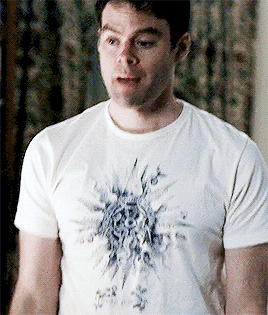
I don’t know if that’s just something I do/have done and I’m projecting, or if it’s because actual research/thought was put into it, but either way it was something that really stood out to me and made him more relatable?
I can’t remember the name of Milo’s ex teacher but he can get fucked for all I care. He took advantage and manipulated a teenage boy and I think that’s important to remember. It would be easy to just freak out because omg cute gay couple but to me I just saw it as a one-sided unhealthy relationship where one is manipulative and abusive to the other who feels like they need their love, and it’s kind of depressing - but then Milo basically says “fuck that” by the end, and it’s beautiful because it’s like he’s deciding “you know what, I deserve to be treated better” - and he does, he really does. Beforehand it felt (to me) like he allowed himself to be used and mistreated because he felt like that was the only way he could feel worthy, but then he grows and develops and I think that’s so important.
I think I should also briefly mention that the scene where Maggie tells Milo “maybe next time you should cut deeper” genuinely broke my heart for many reasons - because she’s so upset and her marriage is ruined and everything is a mess, so much so that she actually says that to him before immediately regretting it. And ofc I was so upset because that’s literally something your brain tells you when you’re depressed and suicidal/self harm, that maybe next time...yeah. You can see the flurry of emotions on his face as he processes what she said, like he’s in genuine disbelief that she - his own sister, his twin - said such a cruel and disgusting thing to him like that. It genuinely broke my heart to see, though I was glad they did eventually mend things between them.
Some other things I want to mention but don’t have the brain capacity to talk about properly because I’m exhausted and a dumbass:
The Marley and Me joke was so relatable omg, I read the more child friendly version when I was little but I had no idea the dog died and it broke my damn heart, so that little joke about Marley and Me was hilarious to me

Honestly I’m talking a lot about Bill Hader but I do truly adore Kristen Wiig too, like she’s probably one of the most diverse actresses who does all sorts of genres and projects - from voice acting to drama to SNL etc - and she’s incredible in this film.
Lance was a sweetheart and I feel sorry for him? Like he genuinely loved Maggie and was such a nice guy, and while some of the stuff he said wasn’t always helpful or correct, it came from a place of caring and that’s what matters. Also he was totally cool with his brother in law who he never met before coming and living in his house, and he even helped Milo get some work (even if said work WAS clearing brush away)
The scene where the twins go out and Bill Hader is dressed in drag is honestly a highlight of this movie
Actually the scene where he sees himself the first time in drag is also a highlight
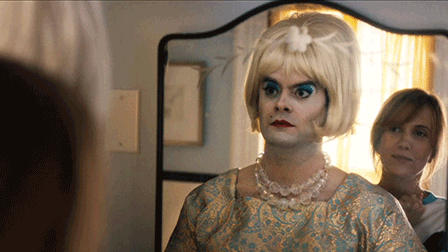
The scene where the mother is making a long ass toast while everyone is waiting to drink their wine, and Maggie/Kristen Wiig just downs her glass before she’s finished is so relatable
Okay but there’s a scene where Milo goes to a gay bar looking for a lay and just...the night he goes, of course it’s fuckin “Dyke Night” (their words, not mine!) and then he comes home absolutely pissed and telling his sister and his brother in law that he just wanted “some c*ck”, omg I was laughing way too hard. Also let’s not forget that he said the two “lesbian ladies” he met were lovely and taught him to play darts, we love mlm and wlw solidarity!!
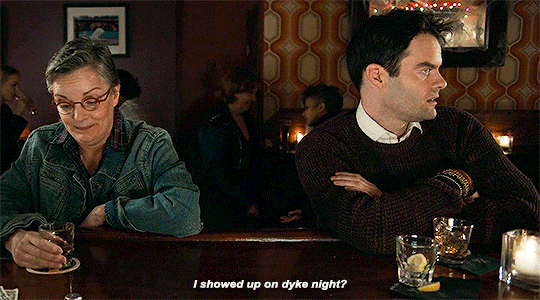
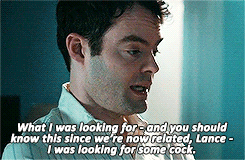
Well since we’ve already established I’m fucking trash for Bill Hader, let’s just include that moment where his character is shirtless (kinda) in bed

That scene where Maggie meets up with some woman she knew (in high school I think?) and that woman has a son, and the son is a little dick and the mom and the son are cussing at each other was a whole new level of hilarious I didn’t expect, like I was deadass expecting this chick to go on about how wonderful it is to be a mother even when he’s a dick to her, how it’s a great gift, but nope, she knows and even says he’s a fucking dick 😂
THE DENTIST OFFICE SCENE JESUS CHRIST I HAD TO PAUSE BECAUSE I WAS GENUINELY PISSING MYSELF WITH LAUGHTER?!
THAT DANCE SCENE AM I RIGHT, OMG, like he’s so cute and happy in that scene and then she joins in and it’s so dorky and fun??
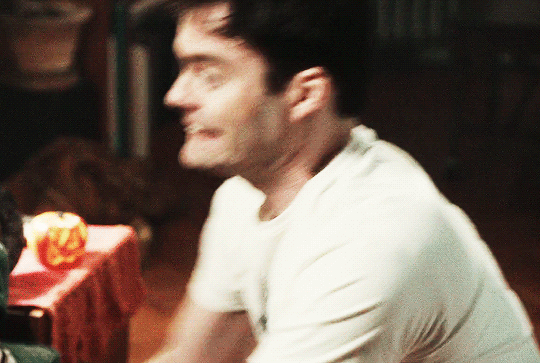
I LOVE all the water imagery and shit, like maybe it’s just because I’m an absolute geek for swimming (it’s one of maybe three sports I don’t totally suck at??) and I love the cinematography underwater, whether it’s the skeleton key ring sinking or the scuba diving or Milo’s goldfish. So much wonderful cinematography and imagery!
This film has ultimately shown me that Wiig and Hader deserve Oscars and awards ASAP
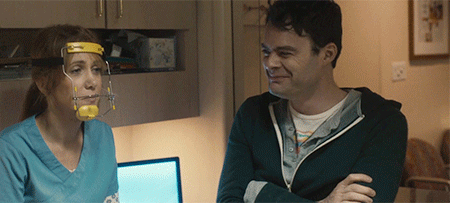
Also this is just a general note to anyone reading, feel free to recommend movies to me anytime because I’m a cinephile and love getting to watch new films!
67 notes
·
View notes
Text
New Post has been published on Cinephiled
New Post has been published on http://www.cinephiled.com/interview-robin-campillo-explores-work-act-paris-powerful-french-film-bpm/
Interview: Robin Campillo Explores the Work of ACT UP Paris in the Powerful French Film ‘BPM’
In Paris in the early 1990s, a passionate group of activists goes to battle for those stricken with HIV/AIDS, taking on sluggish government agencies and major pharmaceutical companies with bold, invasive actions. The organization is ACT UP — the AIDS Coalition to Unleash Power — and its members embrace their task as a literal life-or-death mission. Director Robin Campillo (They Came Back, Eastern Boys), who joined ACT UP Paris himself as a young gay man, tells a riveting story in this film, BPM (Beats Per Minute), of how the ragtag organization helped bring about big changes.
In the Paris college classroom where the members of ACT UP PARIS meet to argue debate strategy and plan its protests, a newcomer named Nathan (Arnaud Valois) is attracted to one of the group’s most outspoken members, Sean (Nahuel Pérez Biscayart). Eager to push the limits in disruptive public confrontations, Sean grows testy and impatient with the more moderate approaches advocated by the group’s leaders, Thibault (Antoine Reinartz) and Sophie (Adèle Haenel). There is an urgency driving his radicalism — his health is more fragile than many of the other gay and straight activists. As the group scrambles from boisterous street demonstrations and boardroom face-offs to dance floors pulsing with light and rhythm, Nathan and Sean’s relationship deepens. As Sean gets sicker, their passion sparks against the shadow of mortality, and the community of activists plots its most dramatic protest yet. I sat down with Robin Campillo and actors Arnaud Valois and Nahuel Pérez Biscayart to discuss this moving film.
Danny Miller: I knew nothing about ACT UP Paris but I did know one of the founders of ACT UP Chicago, Dan Sotomayor, who died in 1992 when this film takes place. I’m sorry I didn’t get involved with the group at the time since I now really see the value of that kind of confrontational political action. Robin, having been a member of the organization, was this something you’ve long wanted to make a film about?
Robin Campillo: Yes. I have always wanted to do a film that touched on the AIDS epidemic but it took me some time to find the heart of what I wanted to say. I wrote some earlier scripts that I put away and more recently found myself thinking of this time in my life in the early 90s when I got involved with ACT UP. It was so not my personality to become militant in any way, but I was so angry and upset at the inaction at the time. I’ve always felt that the most popular political position is indifference. That remains a major problem in our society and it’s something that’s very difficult to fight against.
Do you think it’s because so many HIV-positive people were dying all around you that many people who never saw themselves as radical in any way became these courageous activists?
Yes, absolutely. Mobilization is always very hard to do, but you’re right, it’s because so many people were dying — we felt we had no choice. It’s very rare to have this political window where you can actually start to change things. ACT UP started here in the United States and we were very inspired by the American model. I was an editor for a TV news show and was editing a lot of stories about ACT UP. I heard the president of ACT UP Paris in one of these reports and was very impressed. And then, to be honest, one night I had this sex date planned very close to the place were ACT UP was meeting then, but the guy stood me up. I was upset about that and decided to go to the ACT UP meeting instead — which completely changed my life!
Wow, that’s the best story about being stood up that I ever heard!
(Laughs.) Many people in France at that time (and everywhere) were very afraid and intolerant of gay people, especially because of AIDS. So we decided to use that as a weapon. We would burst into all these events at different organizations and it was very powerful. Amongst ourselves we’d laugh at the effects we had on people — if they were afraid of us, we were going to make them even more afraid in order to make groups take action to help all the people who were getting sick.
I know this film is fictional, but I’m assuming if any character was based on you, it must be Nathan?
Yes, to some extent. Like me, Nathan is a newcomer, he’s shy, and he never thought he would end up an activist. And when Nathan is taking about his past in the film, it’s basically me. I actually wrote that text about 10 years ago for an AIDS conference, and I was very happy to put those words into Nathan’s mouth.
Arnaud Valois: And that was the only scene in the entire film where Robin said, “You have to say it word for word, stick to the text!” The only one.
Robin Campillo: It’s true. Of course, Nathan is much calmer than I was at the time. I really like my characters to have lots of contradictions, I’m not into archetypes that don’t really exist in the real world. I don’t make films because I completely know the characters, I make them because I want to discover the characters along with the audience. The first draft of the character that I write is never going to be the final character, I leave a lot to my actors.
That’s great — and what a lot of responsibility it gives to you, Arnaud and Nahuel. You’re both amazing in the film. Did you also feel a big responsibility to learn as much as you could about those times and the AIDS crisis?
Arnaud Valois: We read a book called ACT UP by Didier Lestrade, the first president of ACT UP Paris, we watched a lot of archival footage of the protests and some documentaries, but you know, Robin told us he did not want us to become experts on the subject — he wanted us to be like our characters, young and a bit naïve, and just go with the flow.
Nahuel Pérez Biscayart: I also watched this amazing documentary called Silverlake Life: The View from Here, from 1993 that was made by two HIV-positive guys who were filming each other and then one of them dies first and then the other. It was such a strong film — real-life first-person stuff about how the sickness really goes. For me, that was the perfect film to watch to understand what my character was going through, I didn’t watch any fiction films of the subject. Then, of course, it was just a matter of trust. I think a good director is someone who sees in you something that you may not be seeing. When you have that kind of trust, the energy just starts flowing, I didn’t just feel like I was playing a character, I felt like something bigger was happening.
I wasn’t there, obviously, but as an audience member, I had the feeling that the same kind of bonding that was happening within the ACT UP Paris group in the film was actually happening with the actors on the set.
It exactly was! Even though we were so different, each person in the cast was just so completely different from one another.
Robin Campillo: And that was the case in ACT UP, too. I wanted to recreate that energy and diversity, and that space and electricity that can happen between people. There’s such possibility when that happens.
Nahuel Pérez Biscayart: Some movies about real events think that they have the answers, that each character has the solution. Nobody gets lost in those films. But that’s not what this film is about at all.
After being in this film, do you feel like you’re more of an activist than you were before?
Arnaud Valois: More aware, that’s for sure, and more concerned.
There are so many analogies you can make to today when you watch this film, even apart from the AIDS crisis. I feel like we’re all being called on to become confrontational activists. Maybe we need an ACT UP Trump movement.
Robin Campillo: Sometimes it takes traumatic events to change a person. I remember reading this science fiction book when I was a kid that was about these aliens coming to Earth and some of the people on Earth really worked hard to learn the aliens’ language but then they discover that the act of speaking their language makes them actually become the aliens. That’s kind of how I felt in my life when I found ACT UP — I became someone different, a foreigner, a stranger to myself. And there was no possibility of going back to how it was before.
You could almost say it’s the other way around — that you were alien before and then you found your real self.
Maybe. But one of the things I love about cinema is that I think it can do that, too. A film can change you and make you feel like a stranger to yourself.
Does ACT UP Paris have an honored position in France these days? Or is the group dismissed as a bunch of troublemakers?
It was certainly not respected at the time by many people. It’s funny, though — to hear the discussions among people at Cannes when we brought the film there, you’d think that everyone loved ACT UP and that everyone was somehow involved with the group. All French people were in ACT UP like all French people were in the Resistance during World War II. No one collaborated with the Germans, right? It’s nice to make these claims now in retrospect but it’s just not true. Most were not on our side back then — we were just a bunch of fags and dykes and way too dodgy to be accepted at the time.
I love that this film does not rely on any of the stereotypes that many American films that touch on the AIDS epidemic do.
Nahuel Pérez Biscayart: Yeah, it’s a very unusual film compared to typical American cinema. Who are the main characters? You can go through half the film and not know. Who are the heroes? Who’s dying? Who’s in love with who?
The length of the film alone (2 hours and 20 minutes) would make American producers go nuts. Robin, did you get any pressure to shorten the film?
Robin Campillo: Not by my producers, but the programmer of Cannes called me and said they really loved the film but it was just too long so could I possibly cut it?
How did you respond?
I said, “Yes, I’ll try my best” and then we told him we cut seven minutes but in truth we only cut one! (Laughs.) They never noticed.
I wouldn’t have minded if it were an hour longer. I would have liked a whole film on Sophie, or the mother, or Thibault — any of those characters.
I love to think that when you see characters that they have an entire world of their own that we’re not seeing — that we don’t know them enough. Characters exist more like that in novels but in cinema, for some reason, characters are often ridiculously narrowed. Why do we have to do that?
I’m sure you’re aware of the horrific attacks against the LGBTQ community here since Trump took office. I assume it’s a much better situation in France right now?
I mean, Macron is not openly attacking LGBT groups, but he doesn’t really care, it’s not a subject he ever discusses. He really doesn’t know very much at all.
youtube
BPM (Bests Per Minute) opens today in Los Angeles and will be playing in select cities nationwide.
#ACT UP#AIDS#Arnaud Valois#BPM (Beats Per Minute)#Nahuel Pérez Biscayart#Robin Campillo#Interviews#What's Hot
2 notes
·
View notes
Text
What’s going on world...21st-century LGBT+ discrimination in the media
Hey back! Forgive my lack of activity lately, but I’ve been incredibly busy these last months with projects and pissing off about society stuff.
Today (or whichever the day you’re reading me in), let me discuss about a topic that really turns on my nerves, and it is the persistent discrimination of the LGTB+ collective in literature, cinema, TV series, and so on.
I’m English literature and linguistics student, and in my senior year I had the grateful chance of taking an elective course concerning the gender discrimination towards women in the (Anglo-American) literary canon. It seems to be unbelievable, but still in 2018, there are female figures in plenty of domains that have been neglected or simple not-taught in school, and even college. Yet, they did/do exist and bring about impressive visions of society that are gathered in a multi-disciplinary movement called feminism. Yes. We all know what feminism is aimed at, even though we don’t conceive the idea that it even goes further on including other “minorities” (I don’t like this word, though) such as the LGBT+ collective, or black, Indian, Latino, etc races. Literary critics like Judith Butler and her must-reading “Gender Trouble” displays the idea of gender performance, and how our identities are socially constructed; that is, they are artificial since they are determined by our sex (mind that not gender). In addition to it, she even questions the so-called universal heterosexuality, whereby all the human race is conceived as heterosexual.
We all have experienced that moment when an adult, when being still a kid, asks you whether you’ve got a boyfriend (to girls) or a girlfriend (to boys). This absolutely affects kids for they believe that’s normative and in case they feel attracted to somebody of their same sex, it turns out to be wrong. Even now, at my 21-years, people keep on asking me whether I’ve got a girlfriend without even questioning if I’m heterosexual.
It’s surprising how this normative/universal heterosexuality is especially spread out through the media. For instance, when visualising a romance movie, you clearly think of a heterosexual couple--regardless of your sexual orientation. This is what society and, let’s say, the patriarchal world have instilled in our minds, so that everything that diverse from that normative heterosexuality is perceived as odd or queer.
You may be thinking, alright Dann, don’t panic since there are many industries that are including LGBT figures in their movies, series or books. I do agree with those of you who think such a thing, and I’m truly glad for that. However, bear in mind that these “gay” people typically play such role; they are rarely protagonists, or just appear as hidden gay men/women who are to come out and express society their sexual preference.
How do you think that we can improve society if being still attached to this mentality? Teach children that there are plenty of ways of loving someone, and that if they love someone of their own sex they are not odd. Many people blame homosexual individuals of not coming out, though if you put yourself in their shoes, you may realise how difficult it still is in 21st-century society. YET, if someone shows any disappointment on your sexual orientation after a long time of “remaining in the closet,” let them know how hard it is if they (just talking from my own experience) keep on saying things like “dyke,” “queer” or whatever to any homosexual person.
Just to conclude this long I-badly-needed-to-express-myself post, let me ask for more LGBT+ inclusion in the media, politics or wherever in order to make the present-day and upcoming generations enjoy a more open-minded society that sees homosexuality, transgender or transsexuality as something absolutely normal as it is heterosexuality; that heterosexuality is just another type of sexual orientation as valid as homosexuality and so others.
0 notes